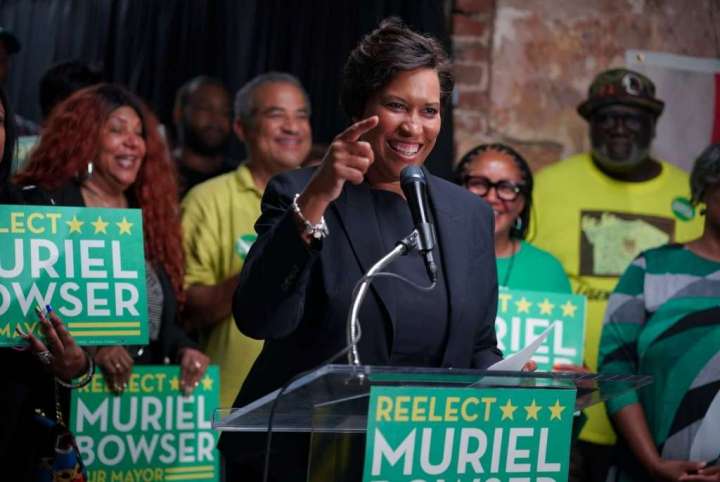Questions raised in this column on the eve of the June 21 D.C. Democratic primary — “Is Mayor Muriel E. Bowser (D) in trouble?” and “Is D.C. Attorney General Karl A. Racine (D) a political kingmaker?” — were answered by 128,000 voters, representing roughly one-third of registered D.C. Democrats.
The voters speak in D.C., but it’s not quite clear what they said

Voters also weighed in on the question, “Will Wards 3 and 5 nominate pragmatists bent more on solving problems than ideological point-scoring?” Less clear, however, was the response to the headline: “On Tuesday, voters will chart the course for a changing D.C.”
If they did, signals were either missed or unsent.
One certainty: Bowser was not in danger of losing her job. She was, however, troubled by the full-throated attack on her administration and governance style by challengers Robert C. White Jr., at-large council member, and Trayon White Sr., Ward 8 council member.
Fortunately for Bowser, Robert White’s hit-her-with-everything-but-the-kitchen-sink approach distracted from Bowser’s actual areas of vulnerability — the perception of tolerance for cronyism in contracting and inattention to management of housing and other big-ticket spending programs. Bowser was also aided by the campaign presence of Trayon White, who failed to gain much traction but drew attention to himself, at Robert White’s expense.
In her post-election rally, Bowser pledged, “We won’t lose our Chocolate City” (a description of the District with which the Census Bureau might take issue). Ironically, her road to victory was powered by 47 percent turnout in largely White Ward 3, which gave her 63 percent of its vote.
Bowser’s Ward 3 vote margin, and tallies in several other White-majority neighborhoods, more than compensated for her loss of Ward 1 to Robert White, and her surprisingly narrow victories in Wards 5 and 6.
In fact, Bowser’s 49 percent overall tally stands in sharp contrast to the 80 percent total she racked up in her June 2018 Democratic primary against two opponents. Therein lies a slight downer for Bowser. She heads toward her third term knowing that half of the city’s Democrats wanted someone else.
A reality check is also in store for D.C. Council Chairman Phil Mendelson, despite his 53 percent to 46 percent victory over Erin Palmer, a local advisory neighborhood commissioner. How could a relatively unknown community leader come from out of nowhere, and in no time flat amass more than 56,000 votes against the veteran, and supposedly politically savvy, council chairman? Could it be that among those voters are residents with growing doubts about Mendelson’s council stewardship — concerns that he might no longer be the right person to lead a cast of assertive, reform-minded lawmakers?
That thought recalls the decisions of voters in Wards 3 and 5, who picked Matthew Frumin and Zachary Parker, respectively, as winners in open-seat council races. The two council nominees aren’t left-wing bomb-throwers, as some establishment Democrats might fear. They are, however, forward-leaning liberals unlikely to bow to the arbitrariness that Mendelson has displayed at times, to the consternation of some of his more junior colleagues.
One of whom is Brianne K. Nadeau, who handily dispatched former D.C. police officer Salah Czapary in her Ward 1 primary. Nadeau is a known quantity in her ward, with both ardent supporters and teeth-gritting detractors. On primary day, Nadeau had more of the former.
Which gets us to Racine, his impact on the Democratic primary and his future political prospects.
Racine is no political kingmaker, as the defeat of his promoted mayoral candidate Robert White attests. To be sure, Racine’s endorsed council candidates — Nadeau, Frumin, Parker and AG candidate Brian Schwalb — won their races. All but Schwalb, however, were on glide paths without him. White and Schwalb were the big ones for Racine. Schwalb, Racine’s former law partner, emerged victorious over prestige-firm lawyer Bruce Spiva, but not because of Racine. There was a spoiler: Ryan L. Jones, an outspent, little-known, independent lawyer who campaigned heavily in majority-Black neighborhoods.
Jones’s 20,000 votes were enough to deny Spiva, a winner of 44,000 votes who billed himself as a civil rights lawyer and son of an HBCU graduate, what he needed to top Schwalb’s 54,000 tally.
Some observers speculate that Racine would have taken on Bowser in the general election had she won with a weaker plurality. That option’s out now. So, too, Racine from the scene?
More attention is shifting to Kenyan R. McDuffie, the Ward 5 council member whose qualifications to run for D.C. attorney general were successfully challenged by Spiva, keeping him off the ballot.
Some veteran D.C. politicos are urging McDuffie to run against Mendelson in the general election as an independent, arguing that McDuffie brings legislative experience and a much-needed collegial style. Another determined group of McDuffie supporters backs a challenge to at-large council member Elissa Silverman, an avowed progressive but a polarizing figure in some D.C. neighborhoods.
There you have it: A course for a changing D.C. that is yet to be charted. Whatever will November bring?






